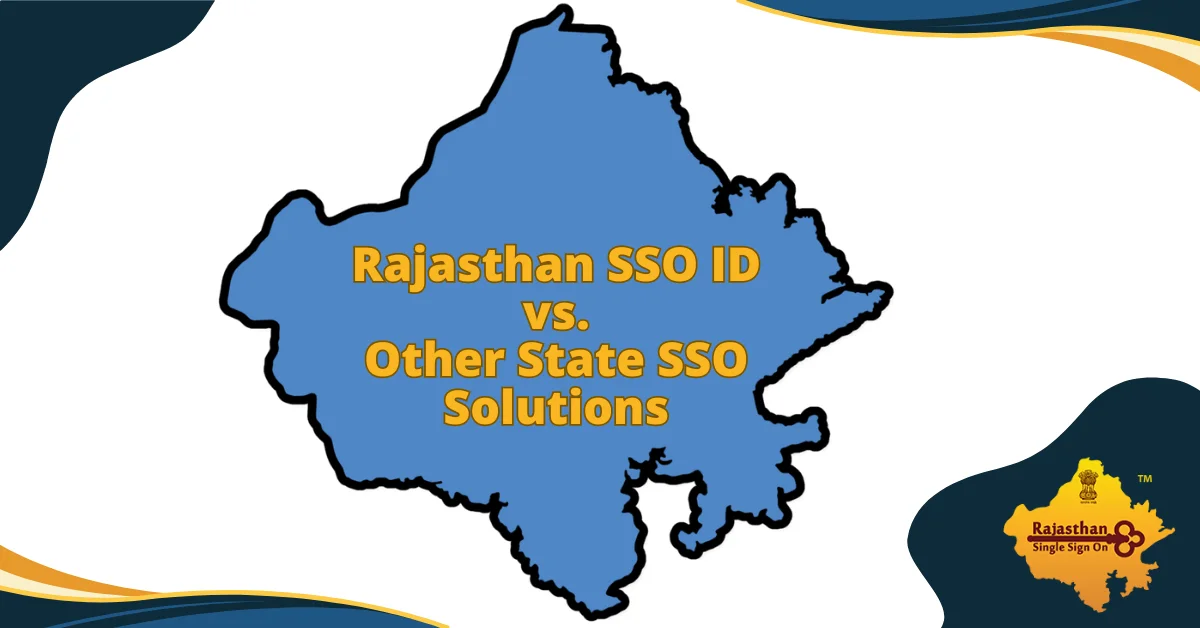Single Sign-On (SSO) solutions are revolutionizing how citizens interact with government services across India. Rajasthan’s SSO ID system stands out as a prime example, but how does it compare to other state offerings?
Let’s dive into a detailed comparison, exploring the similarities, differences, and unique features that set these digital gateways apart.
Contents
Core Functionality: The Common Thread
All state-level SSO solutions in India share a fundamental purpose:
- Unified Access: Provide a single login point for multiple government services
- Simplified Interactions: Eliminate the need for multiple usernames and passwords
- Digital Empowerment: Enable citizens to access services online, reducing bureaucratic hurdles
Rajasthan SSO ID: A Closer Look
The Rajasthan SSO ID system offers:
- Service Integration: Access to over 100 government services
- Flexible Registration: Options include Aadhaar card, Jan Aadhaar card, Business Registration Number (BRN), and Google accounts for Indian citizens
- User-Friendly Interface: Designed for ease of use across various devices
Comparing Key Features
- Number of Integrated Services
While Rajasthan boasts over 100 integrated services, other states may offer varying numbers:
- Maharashtra MahaOnline: Provides access to 400+ services
- Karnataka Mobile One: Offers 4000+ services through its mobile app
- Telangana T-Wallet: Focuses on financial services and bill payments
The sheer number of services doesn’t always indicate superiority. The relevance and frequency of use for citizens are equally important factors.
- Registration Process
Registration requirements can differ significantly:
- Rajasthan: Offers multiple options (Aadhaar, Jan Aadhaar, BRN, Google account)
- Gujarat: Requires Aadhaar-based eKYC for its Digital Gujarat platform
- Tamil Nadu: Uses mobile number and OTP verification for its TNeGA portal
- User Interface (UI) & User Experience (UX)
The design and functionality of SSO portals can vary:
- Rajasthan SSO ID: Emphasizes a clean, responsive design
- Delhi e-District: Features a more traditional government website layout
- Andhra Pradesh e-Pragati: Offers a modern, app-like interface
- Security Protocols
While all states prioritize security, implementation may differ:
- Two-Factor Authentication (2FA): Common across most state SSO solutions
- Encryption Standards: May vary in strength and implementation
- Session Management: Timeouts and automatic logouts can differ
- Mobile Accessibility
- Rajasthan SSO ID: Mobile-responsive website
- Karnataka Mobile One: Dedicated mobile app
- West Bengal Egiye Bangla: Combination of mobile app and responsive website
- Language Support
- Rajasthan: Supports Hindi and English
- Tamil Nadu: Offers services in Tamil and English
- Kerala: Provides Malayalam, English, and some services in Tamil
- Integration with National Portals
- DigiLocker Integration: Available in some state SSO solutions
- UMANG App Compatibility: Varies by state
- Citizen Feedback Mechanisms
- Rajasthan: Offers a dedicated feedback section
- Haryana: Implements a comprehensive grievance redressal system
- Odisha: Features a real-time chat support option
Unique Features of Select State SSO Solutions
- Maharashtra MahaOnline
- Integrated payment gateway for various government services
- Blockchain-based document verification system
- Karnataka Mobile One
- AI-powered chatbot for service assistance
- Gamification elements to encourage digital literacy
- Telangana T-Wallet
- Focus on financial inclusion and digital payments
- Integration with state-specific welfare schemes
- Gujarat Digital Gujarat
- Emphasis on rural connectivity through Common Service Centers
- Integration with state-specific agricultural services
Choosing the Right SSO Platform
Consider these factors when evaluating SSO solutions:
- Residency: Your state of residence will likely determine your primary SSO platform
- Service Relevance: Assess which platform offers the services you use most frequently
- Ease of Use: Consider the user interface and accessibility features
- Security Measures: Evaluate the strength of security protocols
- Support Options: Look for platforms with robust customer support
Staying Informed
To keep up with the evolving landscape of SSO solutions:
- Official Websites: Regularly check state government portals for updates
- News Sections: Follow the news and updates on SSO platforms
- Government Apps: Download official apps for push notifications
- Social Media: Follow official government accounts for real-time updates
The Future of SSO in India
As digital governance evolves, expect to see:
- Increased Interoperability: Greater compatibility between state and national platforms
- Enhanced AI Integration: More intelligent service recommendations and assistance
- Biometric Advancements: Implementation of new authentication methods
- Cross-State Services: Potential for accessing services across state borders
Conclusion
While Rajasthan’s SSO ID system offers a robust platform for citizen services, each state’s solution has its strengths. The key is to leverage the SSO platform that best aligns with your needs and location. As these digital gateways continue to evolve, they promise to make government services more accessible, efficient, and user-friendly for all Indian citizens.
Remember, the ultimate goal of these SSO solutions is to simplify your interactions with government services. By understanding the features and capabilities of different platforms, you can make the most of digital governance initiatives and enjoy a smoother citizen experience.

I am Ravi Kumar, a strong believer in citizen empowerment and the transformative power of technology in government. My passion for simplifying public services through technology led me to work on the Rajasthan SSO ID initiative.

